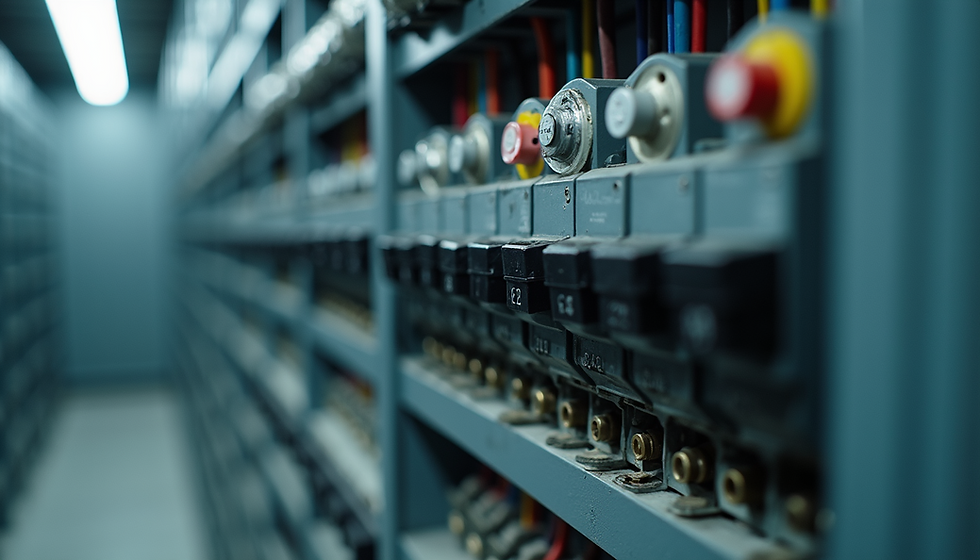Choosing the Right Electrical Panel Board
- teamEE

- Nov 19, 2025
- 4 min read
Selecting the right custom electrical panels is a critical decision for any property, whether residential, commercial, or industrial. The electrical panel serves as the heart of your electrical system, distributing power safely and efficiently throughout your building. Choosing the appropriate panel ensures safety, reliability, and scalability for your electrical needs. In this article, I will guide you through the essential factors to consider when selecting custom electrical panels, helping you make an informed choice that suits your specific requirements.
Understanding Custom Electrical Panels
Custom electrical panels are designed to meet the unique power distribution needs of a building or facility. Unlike standard panels, these are tailored to accommodate specific load requirements, space constraints, and future expansion plans. Customization allows for flexibility in breaker configurations, amperage ratings, and integration with advanced safety features.
When considering custom electrical panels, it is important to evaluate the total electrical load your property demands. This includes all appliances, lighting, HVAC systems, and any specialized equipment. A thorough load calculation ensures that the panel can handle the current and future power needs without risk of overload.
Additionally, the physical size and layout of the panel should fit the available space while allowing easy access for maintenance. Proper labeling and organization within the panel enhance safety and simplify troubleshooting.

Benefits of Choosing Custom Electrical Panels
Opting for custom electrical panels offers several advantages over standard, off-the-shelf options. Here are some key benefits:
Tailored Capacity: Custom panels are built to match your exact power requirements, preventing under or over-sizing.
Enhanced Safety: Incorporating advanced circuit breakers and safety devices reduces the risk of electrical hazards.
Future-Proofing: Panels can be designed with extra slots and capacity for future expansion, saving time and money later.
Improved Organization: Custom layouts allow for better labeling and separation of circuits, making maintenance easier.
Compliance: Panels can be designed to meet local electrical codes and standards specific to your region.
For example, a commercial kitchen may require a panel with dedicated circuits for heavy-duty appliances, while an industrial facility might need panels that support three-phase power and specialized equipment.
Which Brand of Electrical Panel Is Best?
Choosing the right brand is as important as selecting the right type of panel. Reliable brands offer quality components, durability, and excellent customer support. When evaluating brands, consider the following:
Reputation: Look for brands with a proven track record in the electrical industry.
Warranty and Support: Good brands provide warranties and responsive technical support.
Compliance and Certification: Ensure the brand’s products meet national and regional safety standards.
Availability of Parts: Choose brands with readily available replacement parts and accessories.
Compatibility: The brand should offer panels compatible with your existing electrical infrastructure.
Some well-known brands in the industry include Schneider Electric, Siemens, Eaton, and ABB. However, local manufacturers and suppliers can also provide high-quality custom solutions tailored to regional requirements.

How to Select the Right Electrical Panel Board
Selecting the right electrical panel board involves several practical steps. Here is a straightforward approach:
Assess Your Power Needs
Calculate the total wattage of all electrical devices and systems. Include future additions to avoid frequent upgrades.
Determine Panel Size and Type
Choose between main breaker panels, subpanels, or combination panels based on your setup.
Consider Amperage Rating
Common residential panels range from 100 to 200 amps, while commercial and industrial panels may require higher ratings.
Plan for Circuit Breakers
Decide the number and type of breakers needed, including GFCI and AFCI breakers for safety.
Evaluate Installation Location
Ensure the panel fits the designated space and complies with local codes regarding accessibility and clearance.
Consult a Professional
Engage a licensed electrician or electrical contractor to verify your choices and handle installation.
By following these steps, you can ensure your electrical panel board will provide safe, efficient, and reliable power distribution.

Maintenance and Upgrades for Custom Electrical Panels
Once installed, maintaining your custom electrical panels is essential for long-term performance and safety. Regular inspections can identify wear, corrosion, or loose connections before they cause problems.
Here are some maintenance tips:
Schedule annual inspections by a qualified electrician.
Keep the panel area clean and free of dust or moisture.
Test circuit breakers periodically to ensure they trip correctly.
Replace outdated or damaged breakers promptly.
Label circuits clearly and update labels when changes occur.
Upgrading your panel may become necessary as your power needs grow. Adding circuits, increasing amperage, or integrating smart monitoring systems can enhance functionality and safety.
Final Thoughts on Choosing Custom Electrical Panels
Choosing the right custom electrical panels is a foundational step in ensuring your electrical system operates safely and efficiently. By understanding your power needs, selecting reputable brands, and planning for future growth, you can avoid costly mistakes and downtime.
If you are looking for professional, reliable, and affordable electrical solutions in central Kerala, consider working with experienced contractors who specialize in custom electrical panels. Their expertise will help you navigate the technical details and ensure compliance with local regulations.
Investing in the right custom electrical panels today means peace of mind and a solid electrical foundation for years to come.


Comments